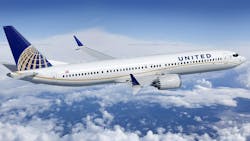Boeing Halts 737 MAX Production
Boeing will suspend production of its 737 MAX aircraft in January, noting it has approximately 400 of the twin-engine jets in storage awaiting the Federal Aviation Administration's clearance for deliveries to resume.
The manufacturer did not indicate how long it anticipates the suspension to last. It stated that no layoffs or furloughs are expected "at this time."
"We believe this decision is least disruptive to maintaining long-term production system and supply chain health," Boeing stated. "This decision is driven by a number of factors, including the extension of certification into 2020, the uncertainty about the timing and conditions of return to service and global training approvals, and the importance of ensuring that we can prioritize the delivery of stored aircraft."
The twin-engine 737 MAX is Boeing's best-selling aircraft, but the 345 jets already delivered to airlines have been grounded for nine months following two fatal accidents, in October 2018 and March 2019. The crashes killed a total of 346 people, and have been attributed to a faulty flight-control program, called the Maneuvering Characteristics Augmentation System (MCAS). MCAS is an "anti-stall" software meant to counter aerodynamic effects of the redesigned jets’ larger engines.
Boeing halted 737 MAX deliveries in March but continued to build new aircraft at a rate of 42 jets per month. It had been preparing to increase that volume in increments toward a rate of 57 jets per month by April 2021.
Boeing redeveloped the MCAS and has been awaiting recertification by FAA, the European Air Safety Administration, and other national safety regulators to install the software on the jets, and to resume deliveries of 737 MAX aircraft.
Last week FAA made it clear the program will not be cleared to resume deliveries until 2020, and also cautioned Boeing to temper its public statements on the resumption of normal program operations.
"Safely returning the 737 MAX to service is our top priority," Boeing stated. "We know that the process of approving the 737 MAX's return to service, and of determining appropriate training requirements, must be extraordinarily thorough and robust, to ensure that our regulators, customers, and the flying public have confidence in the 737 MAX updates.'
The statement continued: "As we have previously said, the FAA and global regulatory authorities determine the timeline for certification and return to service. We remain fully committed to supporting this process. It is our duty to ensure that every requirement is fulfilled, and every question from our regulators answered."
